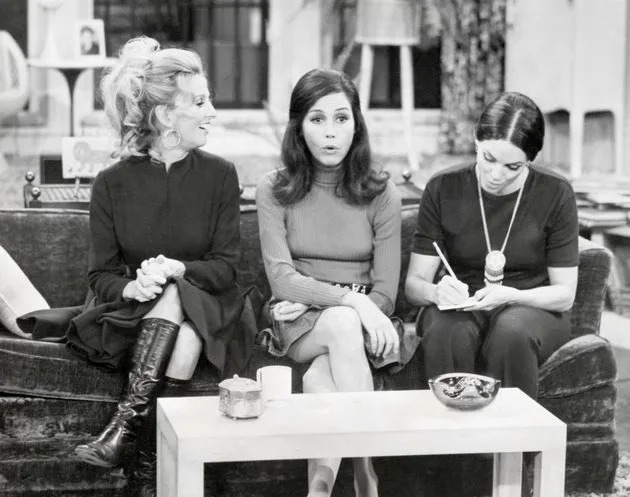- Awards
- 15
MARY's first Christmas episode, December 1970; it's not really all that funny, wimpy Mary and her silly nice-girl problems, but it's the bittersweet period mood which sells it:
Last edited by a moderator:

The show's vibe and atmosphere -- cozy yet wistful -- was vital, although that faded a bit through the years (particularly in that generic later apartment).

The general mood in America changed around 1975. After the Watergate scandal and the fall of Saigon, audiences were so demoralized that they wanted feel-good material rather than the grim material that was often seen in theatrical films in the first half of the decade. But the trend continued to TV as the ratings for All in the Family and Maude were overtaken by the ratings for the bubble-gum like Happy Days and Laverne and Shirley.And that distinctive '70s melancholy did subside as the decade went along, somewhat in keeping with Mary's apartment change. I mean, that atmosphere was still, to a point, there in the late-'70s (and arguably through the calendar year of 1980) but it lessened a great deal after, say, 1975.
View attachment 42467
The general mood in America changed around 1975. After the Watergate scandal and the fall of Saigon, audiences were so demoralized that they wanted feel-good material rather than the grim material that was often seen in theatrical films in the first half of the decade. But the trend continued to TV as the ratings for All in the Family and Maude were overtaken by the ratings for the bubble-gum like Happy Days and Laverne and Shirley.


As far as eras go, it feels like MTM has the best of several worlds. Some of the styling, as mentioned, feels contemporary, and it certainly has the Seventies sense of progressiveness despite its lack of garishness. At the same time, there’s also something of the Sixties Mod about Mary herself
I’m a little unclear as to the title of the series. Onscreen it’s only Mary Tyler Moore, but it seems to be universally - and officially - known as The Mary Tyler Moore Show. I don’t suppose it matters hugely, since I’m going to end up just calling it MTM, but it’s still a matter of curiosity for me.
The tone of the series has already won me over. Not only is the entire cast great, but it just feels so accessible. I already feel very much connected to this cosy little world and it’s a place I not only want to visit but need to continue visiting. Sixteen hours ago I’d never experienced it and already I’d miss it if it wasn’t around.
That apartment set with its painted wood panelling (every time I see that colour I think of Farrow & Ball’s Mizzle) is absolutely beautiful, and I could actually live in a place with this decor and change very little (apart from perhaps the shag carpet). I can’t think of another series of this era where I’ve said that before.
I’m a little unclear as to the title of the series. Onscreen it’s only Mary Tyler Moore, but it seems to be universally - and officially - known as The Mary Tyler Moore Show.
back in an era where character-based comedies series -- good ones -- were unusual
They didn't forget Bess.
Mary has a quality, as does the show around her, that taps into that melancholy vibe as much as any TV series did at the time
I find the feel and atmosphere of the early seasons to be somewhat magical: somehow autumnal with a hint of melancholy, but also very comfortable and snug.
MTM develops as nicely as any show ever does, changes to some degree as it goes on (as indeed it does) and it never slides. It's good to the end.
Be forewarned, however: there is a minority of people who utterly despise THE MARY TYLER MOORE SHOW -- and let's just say they tend to drink a lot of black coffee.
Mary once said in an interview that they left off the THE and the SHOW because "it seemed cozier."
Presumably this is to distinguish between show and actress. Easy enough to differentiate between MARY TYLER MOORE and Mary Tyler Moore in print, but not when speaking.
there was a robust discussion about this some pages back.
In 1970, two shows came along that breathed new life into the genre: ALL IN THE FAMILY and MARY TYLER MOORE. If AITF was loudly revolutionary, MTM was quietly revolutionary -- and all the more effective because of it.
if a similar revolution was happening with British sitcoms around this time
she was well known to American TV audiences by way of her co-starring role on THE DICK VAN DYKE SHOW the previous decade.
And so, when Mary Richards struck out to make it on her own she carried with her two decades of audience familiarity
